New Delhi: It’s noon on 12 October, and a motley crowd of do-gooders has assembled in front of the Hanuman Temple in Malviya Nagar A Block in south Delhi.
The crowd is here because of a video that went viral five days before, and ended up being viewed by over 30 million people on Instagram and over 50 million on Facebook. In the video, an octogenarian couple could be seen talking with teary eyes, grumbling over a lack of customers since the Covid-19 lockdown at their food stall, ‘Baba ka Dhaba’.
The story grabbed attention thanks to the efforts of food blogger Gaurav Vasan, who has been promoting street-food vendors for the last eight years. The Baba ka Dhaba video was the 136th posted on his three-year-old YouTube channel called ‘Swad Official’, and is now being counted among the most popular videos in the history of food vlogging (video-blogging).
And now, Baba ka Dhaba has not only got a crowd to support the elderly couple, but also sponsorship from leading brands such as Pepsi, Zomato and many payment and social media apps.
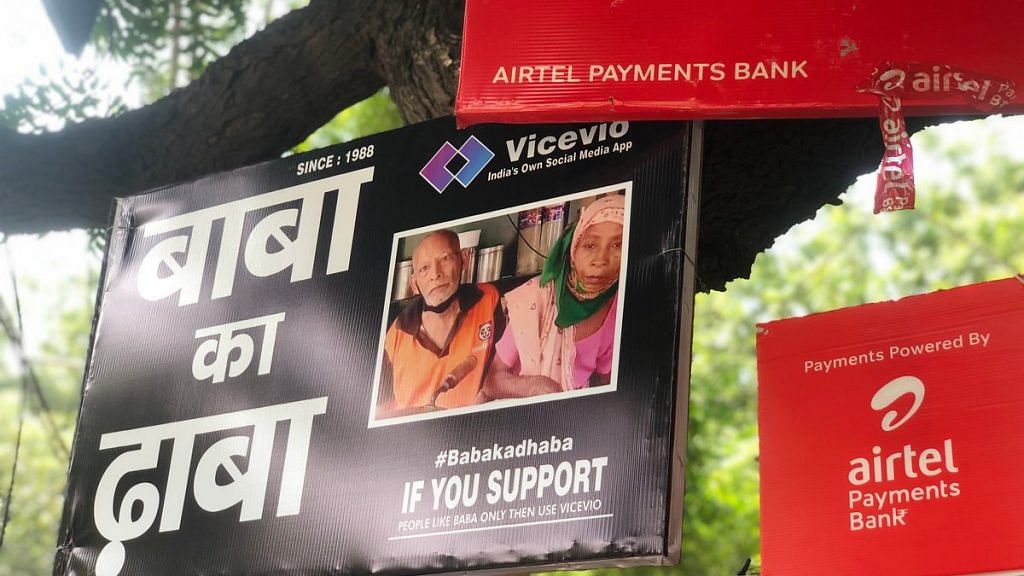
The couple also made it to popular Facebook page Humans of Bombay.
But there’s a downside too. This instant fame has also triggered a game of musical chairs between the brands — one puts up a poster in the morning, another removes it in the afternoon and pastes its own, and so on.
Also read: Delhi’s Baba Ka Dhaba now on Zomato, drawing crowds after video asking for help goes viral
Instant fame
The ‘baba’ from Baba ka Dhaba, Kanta Prasad, and his two sons are serving food at the stall when ThePrint visits in the afternoon on 12 October. The menu includes items like matar paneer, green vegetables, dal, rice and roti. The crowd is large, so Kanta Prasad has ordered more than 4 kg of paneer and green peas.
Kanta Prasad’s wife Badami Devi is sitting on a bench, dressed in a pink saree, and is chopping tomatoes.
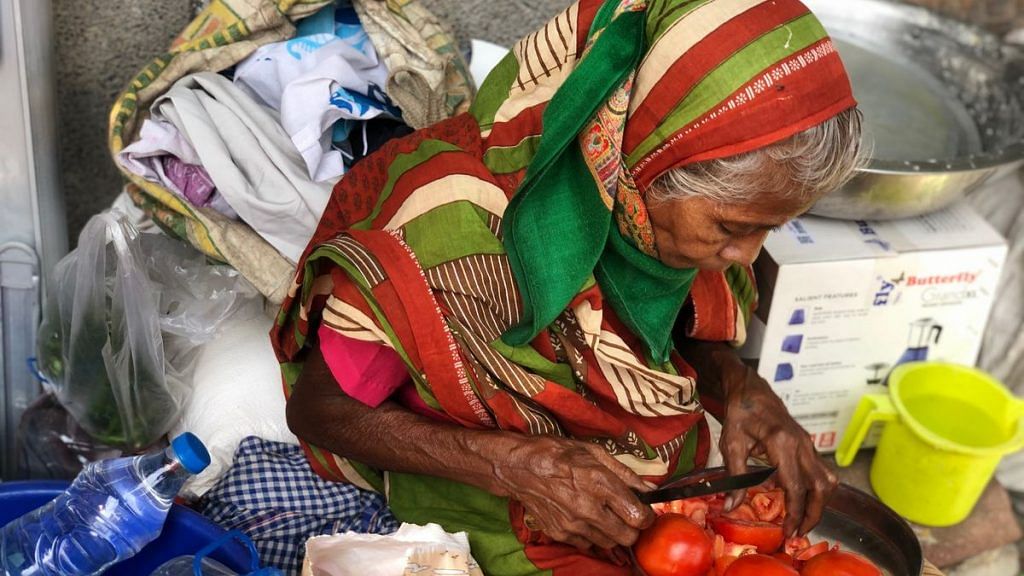
At the same time, a marketing team representing Pepsi is yelling at their sons about the posters from other brands — which they say is “simply not allowed”.
Before the lockdown, the couple’s older son used to work as a ward boy in a local hospital, while the younger son was a delivery boy for Swiggy. Both lost their jobs and have been helping out at the eatery since the video went viral.
Badami Devi is feeling happy and proud — she says some distant relatives who never bothered to connect with their family in years have now come to meet them. The relatives say they are pleased that their ‘Baba-Dadi (grandparents)’ have become an internet sensation.
One man in the crowd says he got emotional upon seeing the video and booked a ticket to travel from Katra, near the Vaishno Devi shrine, to Delhi. Another, a young man from Punjab, tells a similar story.
Rag-picker Vinod, who is collecting garbage some distance away, is also happy that perhaps someday, someone will make a viral video about him too.
The lure of a viral video has also brought small-time YouTubers from Delhi’s neighbouring areas like Palwal and Noida to Baba ka Dhaba. One of these YouTubers is complaining that he should have been here to cover the dhaba story earlier.
After the video went viral, the local MLA, Aam Aadmi Party’s Somnath Bharti, reached the dhaba the very next day, while Bollywood stars Sonam Kapoor and Priyanka Chopra expressed their desire to help out.
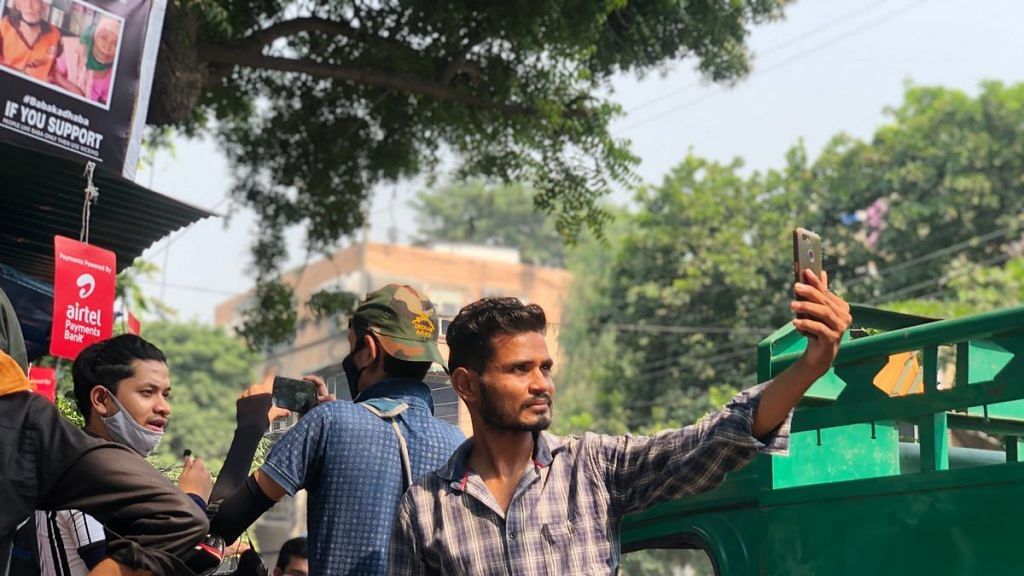
The crowds have started turning up since then, but most of them are selfie-seekers, not paying customers, ThePrint observed. The couple’s elder son Azad Hind says of the crowd: “We are able to heave a sigh of relief only after reaching home in the evenings.”
Amid all this attention, some local residents have also started behaving like their guardian angels, tutoring Kanta Prasad about how to talk to the media and YouTubers.
Also read: After Baba Ka Dhaba, people line up at 90-year-old man’s Kanji Bada stall in Agra
A story of struggle, like millions of others
Badami Devi says each day, she wakes up at around 3 am, and it takes her three hours to finish household chores. “Then, my husband and I take an autorickshaw and come here, and work till about 6 pm. The auto fare alone is Rs 60 per day. But since the lockdown, we had to spend the entire day waiting for customers. We used to carry leftover food home, because our household rations were also about to run out.”
Badami Devi and Kanta Prasad’s story of struggle is not very different from countless others who migrate from small towns to big cities. They came to Delhi from Uttar Pradesh’s Azamgarh in the 1960s, and first lived across the Yamuna in Shahdara. They then shifted to Jagdamba Camp slum in Malviya Nagar. Kanta Prasad used to be a fruit hawker, but then got a licence to run an eatery, and started Baba ka Dhaba in 1990.
“When we got married, I was just three years old, and Kanta Prasad ji was five. I went to his home when I attained puberty (called gauna ceremony), and within a few days, we left for Delhi. I never doubted that he and I would arrange for our livelihood,” she said.
Kanta Prasad and Badami Devi are both quite overwhelmed by the love and opportunity they have received, but he also says in a resentful tone: “There are millions of migrant labourers like us out there across the country who are feeding themselves somehow, but nobody pays any attention to them.”
Their two-room ‘bungalow’
At 5 pm, the family members shut down the stall for the day, and take ThePrint to their two-room house in a narrow, smelly lane in Jagdamba Camp.
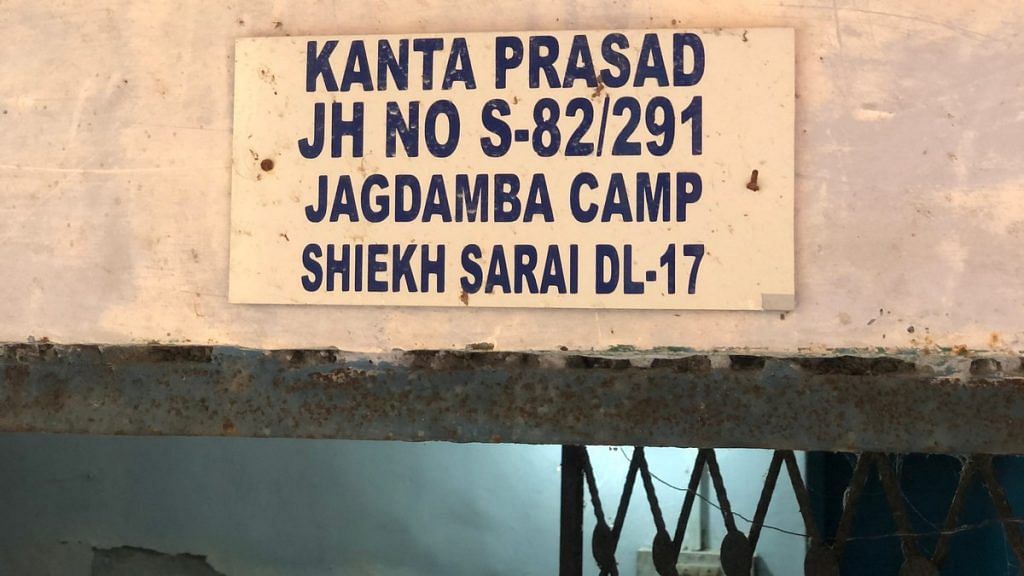
As we are about to enter, Kanta Prasad remarks: “Someone told me that Salman Khan has gifted you a bungalow… Well, this is the only bungalow we have.”
Ten people inhabit these two rooms — the elderly couple, their two sons, a daughter-in-law, a daughter and son-in-law, and five grandchildren. Kanta Prasad says: “We sleep here, wake up here, do chores here, the grandchildren study here… There’s a rumour that we have received Rs 2 crore, which is false — people have indeed donated a lot of money, but crores?”
He is also acutely aware that fame is fleeting. “We know this crowd will last for three to four days only, and after that, everything will go back to the way it was before,” he says.
As Kanta Prasad is saying this, his phone beeps — it’s a message that more money has been donated to them. The house around him is showing signs of it too — there’s a new cooler, mixer-grinder, an Honor smartphone and packs of flour, and everything has been donated by people.
The new technology produces bitter-sweet emotions in Kanta Prasad. On the one hand, he regrets not being able to educate his sons beyond Class 6, something he blames on their poverty as well as technology. “They quit studying due to the lure of video games. What could I or Badami have done? We could either earn to fill their stomachs or sit with them to ensure they study,” he says.
But now that technology has come to his family and dhaba’s rescue, he has a more philosophical, though still negative, view.
“There are hundreds of evil traits in mobile phones, but one good trait. It is good that it has aided people like us, but for people who are always glued to their phones, it is an evil,” he says.
Also read: After Baba Ka Dhaba, call for help for flute wala and pakoda seller floods social media


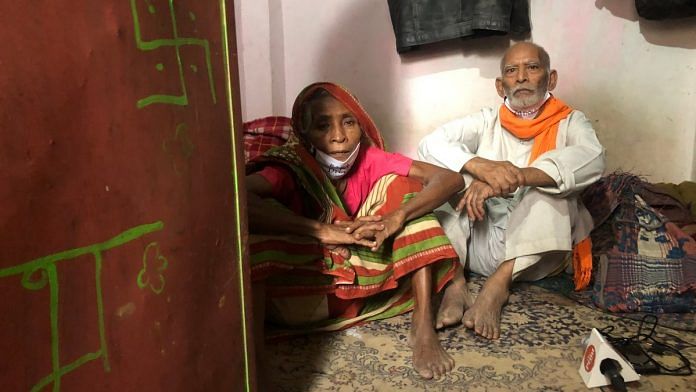

Jyoti Yadav has a pretty distinct point of view and depth in her reports. Not unlike a lot of other educated professionals from the “Tier 2/3” cities and town; but on a national stage the voice is distinct and refreshing. She is sure to rise and gain prominence on the national stage. Congratulations to Mr Shekhar Gupta and Print for recognising talent and allowing it space.
P.S. I have contributed a little to Print. Hope to support you in future also.
Dr Pratik Sahoo
Haha
Ye The Print wale darasal jaha se paida hona chahiye waha se ni balki thik uske pas wale jagah se paida hue he wo b sar k bal nahi balki uske ulte taraf se tabhi inhe har chiz ulta ho dikhta he aur negativity inke khun me mili hogi vansanuvans tarike se.
Now is the season of festivals
Show your true colours and support your local businesses especially kerbs vendors and make sure that their children’s Diwali is unforgettable in the years to come when we are under the cloud of Covid 19
Don’t forget Charity begins at Home
Why do you see everything in negative context Ms. Jyothi Yadav. Have you visited the place and confirmed it?